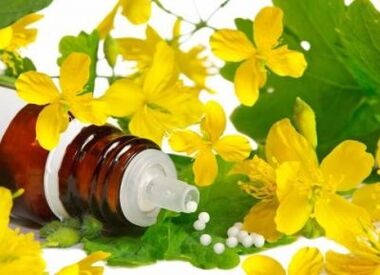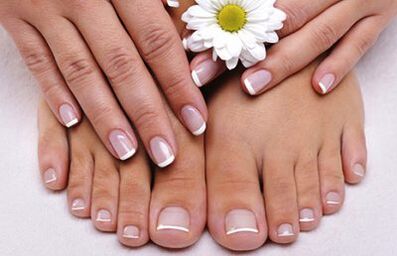Pharmaceutical celandine, or as the people call it - warthog, is a proven remedy against fungal infections, which gives a positive result much faster than many modern ointments, creams and aerosols. To answer the question of whether it is possible to cure nail fungus with celandine, one should understand the properties of the plant, which depend on the components that make up its composition.
Properties of celandine and components that make up the herb
Celandine grass is considered a poisonous plant that secretes an orange milky juice when the stem is broken, which is used to treat the fungus. The composition of the warthog includes alkaloids - substances that relieve inflammation, destroy pathogenic bacteria. The composition also includes essential oils, vitamins, natural antibiotics, and just a huge amount of organic acids.
To figure out if celandine juice helps with nail fungus, let's determine its properties:
- antifungal;
- bactericidal;
- anesthetic;
- healing.
Thanks to the listed properties, celandine destroys the fungus of the foot, interdigital spaces and nails as quickly as possible. There are many traditional medicine recipes based on celandine that allow you to fight various types of fungal infections.
Methods of treatment with celandine

For the preparation of the compositions, both fresh and dry grass are used, which is best collected in the spring, because it is during this period that the plant accumulates the maximum amount of nutrients.
But, using celandine from toenail fungus, do not forget about other methods of treatment. The best option for getting rid of fungal infections is a complex treatment, including grass juice, which is used to treat the affected areas, ointments and creams, as well as drugs prescribed by a doctor for internal use.
Before using celandine against toenail fungus, you need to decide on the type of composition:
- plant juice;
- alcohol tinctures;
- warthog oil;
- decoctions;
- compresses from a mixture of celandine juice and other substances.
Warthog juice in folk medicine
Liquid celandine from nail fungus can be used both as an independent remedy and as a component that is part of the recipe.
It is very simple to prepare a magic juice that gets rid of the fungus. Fresh grass is passed through a meat grinder or ground in a blender. The gruel is squeezed through gauze, which is desirable to be folded in several layers. The juice is mixed with 70% alcohol in a ratio of 1: 1 and infused for 24 hours in a cool and dark place.
The prepared solution can be applied to previously cleaned nail plates 1-2 times a day for several weeks, until the nail is completely restored. You can do compresses. It is only important to remember that the nails must breathe.
The use of alcohol tincture
Alcohol tincture of celandine is prepared as follows:
- 70% alcohol - 250 ml;
- celandine oil - 20 drops.
The ingredients are mixed and infused for about a day.
For the treatment of foot fungus or mycosis located between the fingers, you need to moisten gauze folded in several layers in tincture and apply it to the infected area.
Treatment of nail fungus with celandine requires a slight change in the recipe: 30 drops of celandine oil are added to 250 ml of alcohol. But you need to apply such a solution very carefully, trying not to get on the skin. To apply layers, you can use a brush or cotton swabs.
Before applying the product, the legs must be steamed well in the bath (approximately 10-15 minutes), dry and clean the skin or nail from keratinized particles. Only then should the treatment solution be applied. The result will be noticeable in 10-14 days.
Celandine oil for fungal infections

Treatment of toenail fungus with celandine oil gives a quick and lasting result. In this case, the remedy can be prepared independently, or you can buy it at a pharmacy. The price of the drug depends on its packaging and the pricing policy of the manufacturer.
For self-preparation, you need to take the stem and leaves of the plant, preferably dried. The warthog fits tightly into a jar and is filled with vegetable oil, preferably olive or almond. When using sunflower oil, it should be slightly warmed up in a water bath. Refined oil is not suitable for the preparation of the product. The layer of oil above the grass should be about 1-2 cm. The closed jar is removed in a dark, cool place for 7-10 days. Then the mixture must be filtered and diluted with the same amount of oil.
Celandine oil prepared in this way from nail fungus is used in many recipes. For example, lemon and celandine oil are mixed: 1-2 drops of lemon juice per 2 tablespoons of the drug. The agent is applied to areas damaged by the fungus.
Lemon and celandine soften the nail and allow you to gently remove the stratum corneum with a scalpel. Along with this, the juice of the plant, penetrating deep into the nail plate, begins its healing effect.
When it is necessary to soften the nail plate before applying a medicinal ointment, a mixture of vinegar and celandine is used. Two tablespoons of oil is mixed with 2-3 drops of 3% vinegar and applied as a compress to the infected area.
Before applying the mixtures, it is necessary to steam the nails, dry and wipe the affected areas with hydrogen peroxide. After the peroxide dries, a thin layer of celandine oil is applied. The duration of treatment depends on the speed of recovery of the skin or nail.
Treatment with infusions and decoctions
The fungus of the feet, fingers and nails is well treated with the help of baths from the infusion of the warthog. Recipe: 5 tablespoons of dried herbs are poured into 6 glasses of water. The mixture must be boiled and diluted with cold water to the desired temperature. The duration of the procedure is from 30 minutes. After steaming, problem areas are lubricated with antifungal ointments or creams. A good result is given by the joint intake of antifungal drugs inside.
To prepare the decoction, it is necessary to collect fresh celandine flowers and fill them with water so that the liquid is 3 cm above the level of the laid flowers. Water, according to the recipe, should be boiled. The composition is infused for five days and filtered through gauze folded in several layers.
The finished product is mixed in a 1: 1 ratio with olive, vegetable oil, or iodinol. Before applying the product to the nails, they need to be steamed and cleaned. The procedure should be performed 2-3 times a day for at least 2 weeks. At night, you can make compresses from the decoction.
Compresses from celandine
A unique recipe that promotes the rapid recovery of nail plates damaged by the fungus is a mixture of iodinol and celandine. A liquid slurry is prepared from crushed dry grass, gradually adding iodinol. The resulting thick mass is laid on the nails and covered with cellophane. The compress should be kept for at least 20 minutes. After cleaning the fingers, they should not be wetted for 3-4 hours. The procedure is performed daily.
Compresses have an antifungal effect, soften the nail plates well. The latter property is good to use in the advanced form of the disease. As onychomycosis develops, the nail becomes thicker, deformed, changes its structure, and tissue permeability decreases. After a softening compress, the affected plate is well cleared of keratinized particles. And the ointment applied to the affected area is better absorbed and acts faster.
The compress can be done at night, and removed only in the morning. After that, the nails are steamed in hot water with laundry soap or soda. Ointments or varnishes are applied to neatly trimmed and cleaned nails.
How to avoid reinfection
The fungus is difficult to treat. Therefore, it is important to prevent the recurrence of the disease.
Precautions to avoid reinfection:
- refuse to wear someone else's shoes, socks, use someone else's towels;
- make sure that the legs do not sweat much;
- do not walk barefoot in baths, saunas, pools;
- feet should be washed with soap daily.
The fungus begins to develop with weak immunity. Therefore, it is advisable to drink vitamins and monitor your diet.

























